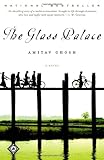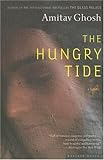|
|
Help |
| Home - Authors - Ghosh Amitav (Books) | |
e99 Online Shopping Mall
|
|
Help |
| Home - Authors - Ghosh Amitav (Books) | |
| 1-20 of 94 | Next 20 |
click price to see details click image to enlarge click link to go to the store
| 1. Sea of Poppies by Amitav Ghosh | |
 | Paperback: 560
Pages
(2009-09-29)
list price: US$15.00 -- used & new: US$2.72 (price subject to change: see help) Asin: 0312428596 Average Customer Review: Canada | United Kingdom | Germany | France | Japan |
|
Editorial Review Product Description Customer Reviews (105)
| |
| 2. In an Antique Land by Amitav Ghosh | |
| Paperback: 392
Pages
(2000-05-06)
list price: US$36.50 -- used & new: US$12.50 (price subject to change: see help) Asin: 817530040X Average Customer Review: Canada | United Kingdom | Germany | France | Japan | |
|
Editorial Review Product Description Customer Reviews (28)
| |
| 3. The Glass Palace: A Novel by Amitav Ghosh | |
 | Paperback: 512
Pages
(2002-02-12)
list price: US$15.00 -- used & new: US$8.55 (price subject to change: see help) Asin: 0375758771 Average Customer Review: Canada | United Kingdom | Germany | France | Japan |
|
Editorial Review Product Description Customer Reviews (86)
| |
| 4. The Hungry Tide: A Novel by Amitav Ghosh | |
 | Paperback: 352
Pages
(2006-06-07)
list price: US$13.95 -- used & new: US$3.99 (price subject to change: see help) Asin: 061871166X Average Customer Review: Canada | United Kingdom | Germany | France | Japan |
|
Editorial Review Product Description Customer Reviews (44)
| |
| 5. Incendiary Circumstances: A Chronicle of the Turmoil of our Times by Amitav Ghosh | |
 | Paperback: 320
Pages
(2007-04-23)
list price: US$18.95 -- used & new: US$4.19 (price subject to change: see help) Asin: 0618872213 Average Customer Review: Canada | United Kingdom | Germany | France | Japan |
|
Editorial Review Product Description Customer Reviews (2)
| |
| 6. The Shadow Lines: A Novel by Amitav Ghosh | |
 | Paperback: 256
Pages
(2005-05-03)
list price: US$14.00 -- used & new: US$6.00 (price subject to change: see help) Asin: 061832996X Average Customer Review: Canada | United Kingdom | Germany | France | Japan |
|
Editorial Review Product Description Customer Reviews (30)
| |
| 7. The Circle of Reason by Amitav Ghosh | |
 | Paperback: 432
Pages
(2005-05-03)
list price: US$14.00 -- used & new: US$3.16 (price subject to change: see help) Asin: 0618329625 Average Customer Review: Canada | United Kingdom | Germany | France | Japan |
|
Editorial Review Product Description Customer Reviews (3)
| |
| 8. The Calcutta Chromosome: A Novel of Fevers, Delirium & Discovery by Amitav Ghosh | |
 | Paperback: 320
Pages
(2001-02-01)
list price: US$14.99 -- used & new: US$6.00 (price subject to change: see help) Asin: 0380813947 Average Customer Review: Canada | United Kingdom | Germany | France | Japan |
|
Editorial Review Product Description From Victorian lndia to near-future New York, The Calcutta Chromosome takes readers on a wondrous journey through time as a computer programmer trapped in a mind-numbing job hits upon a curious item that will forever change his life. When Antar discovers the battered I.D. card of a long-lost acquaintance, he is suddenly drawn into a spellbinding adventure across centuries and around the globe, into the strange life of L. Murugan, a man obsessed with the medical history of malaria, and into a magnificently complex world where conspiracy hangs in the air like mosquitoes on a summer night. Customer Reviews (50)
| |
| 9. Irrawaddy Tango by Wendy Law-Yone | |
 | Paperback: 304
Pages
(2003-04-16)
list price: US$15.95 -- used & new: US$8.50 (price subject to change: see help) Asin: 0810151421 Average Customer Review: Canada | United Kingdom | Germany | France | Japan |
|
Editorial Review Product Description Customer Reviews (3)
The book is brutal, explicit and bitter; Tangoherself is not entirely likeable, particularly in her patronizing anddismissive attitude towards fellow refugee Dayans in Washington.But thereis a lot of brutality and bitterness in the scenes Law-Yone describes &no doubt they are not far from life. ... Read more | |
| 10. Dancing In Cambodia At Large In Burma by Amitav Ghosh | |
| Hardcover: 114
Pages
(1998-06-30)
list price: US$13.50 -- used & new: US$14.95 (price subject to change: see help) Asin: 8175300175 Average Customer Review: Canada | United Kingdom | Germany | France | Japan | |
Customer Reviews (2)
| |
| 11. Amitav Ghosh (Contemporary World Writers) by Anshuman A. Mondal | |
 | Paperback: 224
Pages
(2008-01-15)
list price: US$26.00 -- used & new: US$21.93 (price subject to change: see help) Asin: 0719070058 Canada | United Kingdom | Germany | France | Japan |
|
Editorial Review Product Description | |
| 12. Dancing in Cambodia and Other Essays by Amitav Ghosh | |
| Hardcover:
Pages
(2008)
Asin: B003GX7Z4W Canada | United Kingdom | Germany | France | Japan | |
| 13. Interpretations Amitav Ghosh's the Shadow lines (Creative new literatures series) | |
| Unknown Binding: 127
Pages
(2000)
-- used & new: US$51.13 (price subject to change: see help) Asin: 8186318739 Canada | United Kingdom | Germany | France | Japan | |
|
Editorial Review Product Description | |
| 14. Contemporary Indian Writers in English: Amitav Ghosh by John C Hawley | |
 | Paperback: 224
Pages
(2005-03-01)
list price: US$25.00 -- used & new: US$10.99 (price subject to change: see help) Asin: 8175962593 Canada | United Kingdom | Germany | France | Japan |
|
Editorial Review Product Description | |
| 15. Amitav Ghosh: A Critical Companion | |
 | Hardcover: 185
Pages
(2003-01)
list price: US$32.00 -- used & new: US$30.89 (price subject to change: see help) Asin: 8178240742 Canada | United Kingdom | Germany | France | Japan |
|
Editorial Review Product Description | |
| 16. The Novels of Amitav Ghosh | |
| Hardcover: 296
Pages
(1999-02)
Isbn: 0861323963 Canada | United Kingdom | Germany | France | Japan | |
| 17. Amitav Ghosh: Critical Perspectives by Brinda Bose | |
| Hardcover: 221
Pages
(2003-01-01)
-- used & new: US$38.62 (price subject to change: see help) Asin: 8185753520 Canada | United Kingdom | Germany | France | Japan | |
| 18. Amitav Ghosh's the Shadowed Line: Critical Perspectives | |
| Hardcover: 304
Pages
(2010-07-03)
-- used & new: US$48.33 (price subject to change: see help) Asin: 8178510014 Canada | United Kingdom | Germany | France | Japan | |
|
Editorial Review Product Description | |
| 19. The fiction of Amitav Ghosh (Creative new literature series) by Indira Bhatt | |
| Hardcover: 239
Pages
(2001)
-- used & new: US$40.76 (price subject to change: see help) Asin: 818631881X Canada | United Kingdom | Germany | France | Japan | |
|
Editorial Review Product Description | |
| 20. Das Calcutta Chromosom. by Amitav Ghosh | |
| Paperback: 285
Pages
(1999-05-01)
Isbn: 3442724899 Canada | United Kingdom | Germany | France | Japan | |
| 1-20 of 94 | Next 20 |